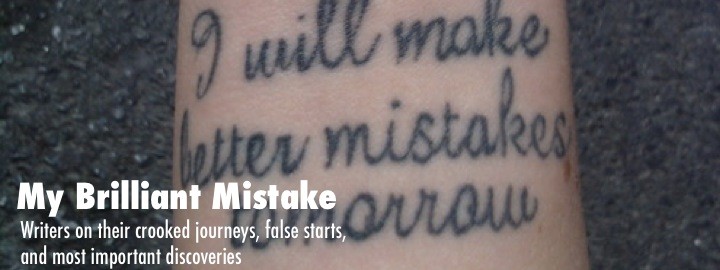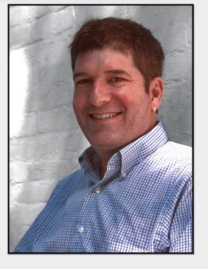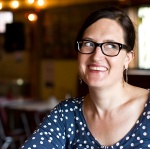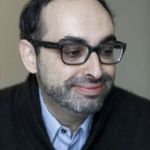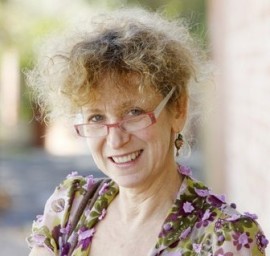Though Robin Hemley has directed the Nonfiction Writing Program at the University of Iowa for the past nine years, he’s in the midst of a big transition: beginning this summer he’ll be the new director of the creative writing program at the Yale-NUS university in Singapore.
Hemley comes from an unusually literary family. His father, Cecil Hemley, was co-founder and co-director of the Noonday Press, where he worked tirelessly to help translate and promote several books by Isaac Bashevis Singer. His mother, Elaine Gottlieb, is a short story writer whose circle included other leading lights of 20th century literature including Delmore Schwartz.
However, it’s his brilliant sister, Nola Hemley, who cast a particularly large shadow on Hemley. Nola, a schizophrenic who died of a possible medical overdose at age 25, was eleven years years older than Hemley. She came of age in the late 1960s, so her yearning for all things spiritual would seem at first glance well matched with that decade’s obsessions. But her search began early and was wholly her own. In his memoir Nola: A Memoir of Faith, Art, and Madness (originally published in 1998 and just reissued by the University of Iowa Press) Hemley uses an unpublished memoir written by Nola, as well as letters, short stories, court documents and maybe most strikingly Nola’s own strange, surreal drawings, to tease out the contradictions of both his sister’s and his own earlier selves.
Hemley is also the winner of a Guggenheim Fellowship for his memoir DO-OVER!. He has published 10 books, and his stories and essays have appeared in the New York Times, New York Magazine, Chicago Tribune, and many literary magazines and anthologies. He is the editor of Defunct magazine.
This blog is called “My Brilliant Mistake: Writers on their crooked journeys, false starts and unexpected discoveries. “ Can you tell me about a mistake of yours, brilliant or otherwise, that led to an unexpected turn of events?
Well I’m good at making mistakes, though I don’t know how brilliant they are. Anytime you take a risk you’re going to make a mistake. I think the biggest mistakes I’ve made is when I’ve been working on something I shouldn’t have been working on. Or I’ve taken someone’s advice I shouldn’t have taken and not staying true to my own vision of things.
I feel like Nola was the right book for me to work on at that time. I had been working on a novel with the main character of Amelia Earhart. I’d read all these biographies and everything, and then one day I walked into a bookstore and there was a novel about Amelia Earhart. It wasn’t exactly the book I wanted to write, but it was very close. That put me into a bit of a funk for awhile. I thought I’d had this chance and then blown it.
Even so, that book got a lot of attention at the time, but it’s not a book that’s had a lot of staying power. So if I really wanted to, I could go back to the idea and my idea would be different. But at this point I’ve moved on and it’s old territory. In a way, though, that event freed me up to write Nola.
I’m constantly reading about new expeditions to find out what happened to Earhart. There was just one last year, trying to locate some by Gardner’s Island in the Pacific. Were you interested in the mystery of what happened to her? Was that the lure?
Yes and no. Yes, it had to do with the mystery, but I also had an idea about a larger American paradigm I wanted to explore.
So what I instead was Nola. I still feel like that’s my best book. It’s had a kind of staying power, for me at least, which has been good. I’m not embarrassed when I read it [laughs]. I feel that what happened was fine. So I don’t know what the mistake was there — whether it was not writing my Amelia Earhart book fast enough, or dedicating myself enough to it. I just don’t know. [laughs]
Nola seems like a book you had to write.
Yeah.
It feels like a book you were carrying around for awhile.
Well, I wasn’t carrying it around as a book. I was carrying it around as a life experience. I knew I wanted to do something with it but I didn’t know what. It wasn’t actually until I met Tobias Wolff. He just gave me a kind of permission to write it as a memoir. He did it in a way he would never remember—it was just over a casual lunch—but it was important to me. It was the kind of thing I needed to hear at the time. You know, this was 1995 or something.
What did Tobias Wolff say to you?
Oh, it was very simple. It was the most casual comment. I can’t remember what led us to talk over lunch about my sister Nola, but I told him about her and he said, “‘you know, you should write that as a memoir.” And that’s all he needed to tell me. I hadn’t thought of it in terms of a memoir. I only thought of fiction. It was a different time, you know, in terms of people’s attitudes toward memoir. I mean, he’d done it, but there weren’t a whole lot out there.
I remember the late 1990s as a different time for memoir. Wolff himself wrote an op-ed in the New York Times swatting away critics of the form. Today, even though the form is more popular than ever, there’s still this ganging up that goes on.
I know, yeah. I mean, I think it’s ridiculous. But it happens. I think it comes from this sort of journalistic insecurity. You know, journalists are hanging on by their nails. And they all have memoirs they want to write. So they’re jealous! [laughs]
There’s an episode early on in the memoir where you describe learning some facts about your mother’s life you didn’t know. You’re reading a short biography of your mother. This was in Best American Stories 1946, where a story of hers had appeared. You write:
I wondered if she neglected to tell me because I didn’t need to know. But, if so, then she was wrong, because everyone’s life, I believe, is a kind of detective story, every clue of our forebears’ lives, every decision, missed opportunity, guessed motivation, a part of the solution to our own existence.
That sentence really struck me. How are people’s lives detective stories?
I’m fascinated by the way in which people—including myself—feel that their actions are inspired or reflected or shaped in opposition to that of their parents. Or their grandparents. I mean, your grandparent does something 80 years ago, it doesn’t really reflect on you. And yet we always act as though it does. Or maybe in some ways it does. So I’m curious about our relationship to the past. Not just our own past, but other people’s past. I’ve always found that fascinating. It’s not that the action of someone else foretold our own actions, but we often act as though they did. So it’s really our own obsession that’s getting reflected back in the search for meaning in someone else’s life. And that’s what I’m interested in. I’m interested in this constant back and forth between the present and past.
Let me pick up on that. I like the way you embed a lot of voices in your book. You’ve included an unpublished memoir your sister wrote in the book. You include short stories, pastiches of other stories, court documents, etc. Can you talk about the way in which this form came about for you? How did it evolve?
It was completely intuitive. I can’t say I had this over-arching notion. But in writing the prologue. The prologue came first. I really didn’t know what I had done. It was very fragmented. But I used it as a kind of roadmap. Once I saw the book as a not just a detective story, but a kind of trial, then I started thinking about evidence. And what kind of evidence there was in my family’s past in sorting through fact from fiction. In my case, it was quite simple: it came down to documents.
Then there was the court transcript I found. When I made that rediscovery with that document, then things started falling into place. It was really interesting that my mother really resisted telling me this stuff and that she then uses aspects of her life through fiction. Yet she can’t bear to say it really happened.
At one point in Nola you describe how, when you were five years old, you and your older brother saw the ghost on the staircase of your house in Athens, Ohio. Many years later you read your sister’s account of what happened and it’s very different from your memory. That causes you to reflect on the role of contradiction in your writing:
…If I tell you I saw a ghost when I was five it tells you nothing about me, there’s no way for you to enter that experience. But I let my sister tell you the story and I tell you the story in different fashions, and somewhere there, in that space between contradictions, lies a kind of truth that perhaps you can enter into and wonder about.
Can you talk to me more generally about the role of contradiction in Creative Nonfiction?
Well, I love contradiction. The only way to come to any kind of wisdom is to be hit in the face by things that are contradictory and then to figure out where the truth lies. I think that the essay and CNF is a form that embraces contradiction more than any other.
I think the essay—and I do think that NOLA is, in its way, an essay—is about my own uncertainty. I think that contradictions point to fate of uncertainty that we all live in. And that’s very much what writers in creative nonfiction, or at least the essayist does. It’s an exploration of uncertainty. Anyhow, those are the writers I’m most interested in.
Yeah, I agree. I love that sense of the form as open-ended, as coming to an understanding.
If you’re on a journey, then you’re on a journey with the reader. And the reader should feel that too. I know there are some writers who hate uncertainty, who feel an uncertain narrator is an untrustworthy narrator. But I don’t feel that at all. I feel that an uncertain narrator is the most trustworthy.
Switching subjects, your book touches on two major figures in 20th century American Jewish writing. One is Delmore Schwartz and the other is Isaac Bashevis Singer . Can you talk about why you decided to include a chapter in Nola modeled on Schwartz’s story “In Dreams Begin Responsibilities”?
Well, Delmore Schwartz was someone both my parents knew. And he was an important figure in their lives. And I love “In Dreams Begin Responsibilities”—I’ve always loved it. My mother loved it too. So I felt that of all the stories I could pick out, this story is one I could appropriate in a way. Because it was central to my family’s drama.
Was Schwartz’s decline—for example, he’s lampooned a bit in Saul Bellow’s Humboldt’s Gift—dinner time conversation in your house? Was he as a presence in your house?
Not as much as [Isaac Bashevis] Singer was. But in some ways, because one of my mother’s very good friends was Elizabeth Pollet, who was Delmore Schwartz’s widow. So whenever she came over they talked about Schwartz.
Your family’s story is very intertwined with that of I.B. Singer. Your father Cecil Hemley helped to translate and publisher several of Singer’s novels from Yiddish to English. Your mother was very friendly with him. And your sister Nola, considered him her best friend in her adolescence. I wonder if in writing your book you came to see him any differently?
No. I think I always viewed him with a bit of a jaded eye. I viewed him the way my mother viewed him. I felt that he didn’t quite give his tranlsators enough credit. As she felt. I also felt that he was rather sexist. As she felt. So that colored my appreciation of his stories. I don’t think about him a whole lot, but when people tell me they love Singer it doesn’t make my heart soar. I think, well, fine. But he’s not one of my favorite writers.
Singer and your sister seemed to have quite a friendship when she was a teenager. She told him about dreams and visions that she’d had, and he helped her to interpret these. Along with her obsession for all things spiritual, your sister also had, like Singer, quite an interest in the occult and the supernatural. Was her interest the purer of the two? Was Singer more calculating in how he used the supernatural and occult?
I don’t think he was more calculating. I think he was genuinely interested in it. You know, he came from a culture that was much more accepting of the supernatural and the paranormal than ours. Also, my sister was rather brilliant, so I think he enjoyed her company, enjoyed talking to her. But I don’t think he was calculating about his interests.
You write both fiction and nonfiction. Can you talk about how one feeds into the other? Do you see yourself more as one or the other now?
I’m starting to see myself more as an essayist. I clung to the belief for awhile that I was a fiction writer—and I do write fiction—but I was more that in my youth. And now more I love the essay form. One thing about being [at the University of Iowa] for 9 years is a greater engagement with the essay. I’d say right now—even though I’m writing a novel—is that I’m more in the essayist’s camp.
